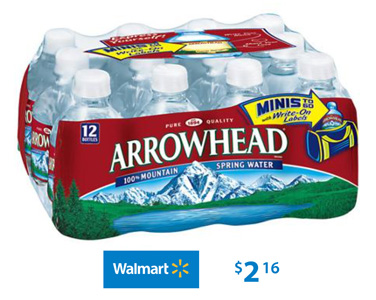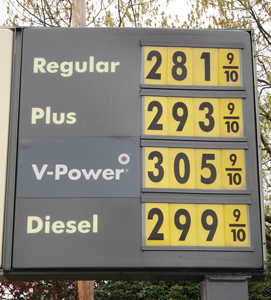







This is an archived article. Click here to return to the blog's home page.
Oregon's Liquid Gold
Bottled water is big business in Oregon, and the public is the loser
Entry 12: April 23, 2015. Updated May 22
 |
 |
| Nestlé water: $2.88 per gallon, about the same as gasoline for you and me. But Cascade Locks plans to steal it from public land and sell it to Nestlé for less than 0.2 cents per gallon (two tenths of a cent!)1 | |
It rains a lot in Oregon. So it seemed that the Nestlé proposal to bottle a little bit of spring water in the Columbia Gorge wasn't a big deal. It's only half a cubic foot per second, and one tenth of the total volume coming from Oxbow Springs. It creates 50 jobs and property taxes for the struggling town of Cascade Locks. What could possibly be wrong with that?
But something felt strange about the plan. It's so little water, why bother? Well, there's a reason Nestlé chose to use units of cubic feet per second. It sounds so tiny. Let's do some math: This flow adds up quickly, to 5.2 million 8-ounce bottles per day. At Walmart, 12 of them go for $2.16. This works out to about $931,000 per day in retail revenue. That's big money. So Cascade Locks is getting screwed. They don't know it. Also, the Gorge is getting screwed; the state of Oregon and its taxpayers are all getting screwed. A good chunk of this money should go to help protect the land and water that makes it possible to sell $340 million worth of product per year. Are you mad yet?
It wasn't enough for Nestlé to get water to fill millions of bottles per day. They also wanted it cheap. So a plan was hatched to take city water from a well and trade it to the local fish hatchery in exchange for the same volume from a spring on state-owned land that feeds the hatchery. Voilà! Cheap water for the hatchery becomes valuable water for Nestlé. Conveniently, the swap circumvents Oregon law to avoid a review of the plan for the public interest.
Regardless of the environmental impact of this project, there's a dirty little secret that Nestlé and other producers don't want you to know. It's pure profit. Put something that's almost free in a bottle, sell it, and don't tell anyone how much money you walked away with. The public interest be damned. The spring is on state land and it's a public resource. We all own it, and we're fools to just give it away through a water-rights swap that's more properly called a swindle.
What galls me the most is that government officials either are so naive to be hoodwinked by this plan, or they are in bed with Nestlé and don't want to charge a fair price for the water that benefits the public. Gordon Zimmerman, the city's administrator, wants to sell the water to Nestlé for less than what residents pay. The reason: Nestlé is buying in volume.(1) There's no consideration that the water, once bottled, is being sold at an outrageous profit margin. At the quoted rate of 0.2 cents per gallon, which is likely higher than what will be negotiated, the plant would only pay an annual water bill of $236,000. Assuming a 35% profit margin, the plant would pay that bill off in only 17 hours of operation.(2)
I couldn't find anything else made in the Columbia Gorge that produces that kind of revenue except agriculture. Hood River and Multnomah counties produce about $160 million in agricultural products annually.(3) So we are sitting on a resource that could have a greater economic impact than farming, if we are careful to manage it right. The retail price of Nestlé's water is about the same as gasoline. In Oregon we complain gas prices are high because there's no oil here. Water is our liquid gold. It means big money to those who understand this. It's time we all understand this. The issues surrounding the Nestlé plan are complex, but the dollars behind it are not. We consume about 150 million gallons of bottled water per year in Oregon.(4) Taxed the same as gas, it would produce $50 million in revenue statewide or a thousand family-wage jobs, not just the fifty that Nestlé is throwing like a bone to Cascade Locks. We could fund jobs in things that have long been neglected, such as litter pickup, trail maintenance and construction, anti-theft patrols at popular recreation sites, watershed enhancement, invasive plant removal, and many other things to improve a precious resource that we didn't know was so valuable.
While government wants to give Nestlé the benefit of the doubt that they'll be a responsible player, California has just discovered that the company has operated under an expired permit for 27 years. In the middle of a severe drought, the issue is finally being examined. Times have changed. Oregon rain is no longer a nuisance; it's a valuable asset. In the past, Oregon was known as a timber state. In the future, we will be known as a water state. This is coming, and we can't stop it. Our laws haven't kept up. We need to get ahead of this situation before it's too late. Agencies need the power to consider the public interest in water deals, and to make sure the benefits from water that is a state trust are shared with all residents and don't go out of state or to just a few who will try to exploit it.
Here's one example of these new economics. There is much grousing about a federal proposal to allow increased logging on O&C lands in southern Oregon, to provide an additional $36 million to counties stricken by cutbacks in the timber industry. Just one bottling plant in that area, properly managed, could provide all that money and more to the entire region—without cutting one tree.
While the Department of Water Resources is no longer accepting comments on this proposal, there is still time to contact Governor Brown, who can take the public interest into account. Emphasize to her that the water rights transfer is a legal ploy to avoid a public interest review and should not be granted. Also let her know the water is too valuable to give away, and the state should receive fair compensation from any bottling plant that uses public water. Contact your legislators at this link to let them know you want better protection of public water, and to ask for a tax on bottled water. A tax would be fair because it would apply to all producers equally, and would discourage bottled water use, which is wasteful in terms of litter, plastic, and fuel used to transport it. Water from the tap in Oregon is almost always of higher quality than from a retail bottle.
Note that Oregon government websites do not accept text with special characters. If you receive an error, remove them.
References:
1. City of Cascade Locks fact sheet on Nestlé: http://bit.ly/1EfoCtw
2. Carvalho, Chris. "Nestlé Bottled Water Plant Analysis." http://www.lensjoy.com/blog/Nestle_Analysis.pdf
3. “Oregon Agriculture: Facts & Figures July 2014.” Oregon Department of Agriculture: http://www.oregon.gov/ODA/shared/Documents/Publications/Administration/ORAgFactsFigures.pdf
4. “Bottled Water in Oregon.” Oregon State University Institute for Water and Watersheds: http://water.oregonstate.edu/sites/default/files/bottled_water_v5.pdf
